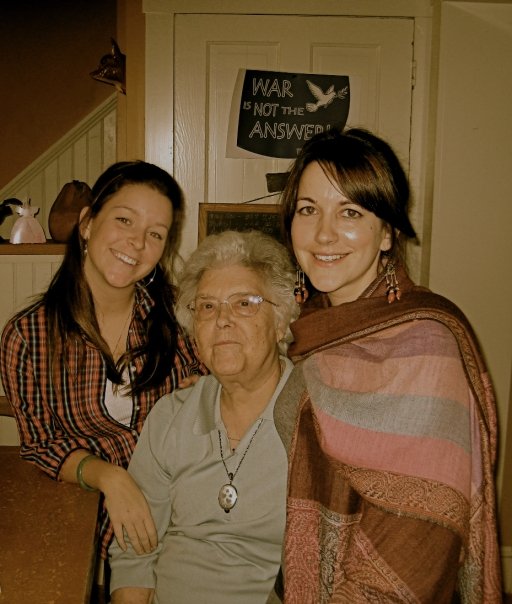On May 4th, my grandmother passed away. It does blunt the edge of my sadness a bit to realize (and be grateful) that she was a strong, vital presence in my life for over 30 years. She was not a vague idea of “grandmother,” but someone I knew and loved and respected. As happens after a death, there are details and arrangements to be figured out and delegated. Call the funeral home. Inform all the relatives. Pick out what Grandma will wear. Decide who is sleeping where and who is driving with whom (this last part is actually more complicated than you would think). I was put in charge of writing her obituary1 and using my sister’s notes as a guideline, I included the sentence, “She loved gardening, painting, feeding those she loved and her family . . .” And it was this idea – of food and my grandmother – that became a repeated theme, both at her service and later, when people shared their memories of her.
Born in 1925, Ruth Breeding Bowers grew up with little and learned from an early age how to stretch a meal meant for five so that it could feed eight or more.2 Later, when she married my grandfather William Bowers (after a three-week courtship that resulted in a 68 year marriage, leading me to believe there is no for formula for what makes a relationship work), their home became a second home to his younger brothers. Orphaned at an early age, they perhaps saw my grandparents as a substitute of sorts for the home life they had only experienced briefly.
Later still, with children and cousins and all their multitude of friends, came hungry hordes of youngsters in and out of the house (my father said that he could bring home 10 people and my grandmother wouldn’t blink an eye). There is a quote from Khalil Kibran that I have always loved: work is love made visible. I think for my grandmother making meals and ensuring that everyone was fed was her love made visible – and edible. She always made me sweet potato pie and rice pudding (no raisins) when I would come to visit because she knew they were my favorites. For my brother’s 21st birthday, she brought an entire fried chicken dinner over to my parents’ house – enough to feed Luke and me and all our hung-over friends.3 There was always a jar of cookies and nearly the first words out of her mouth (after a long hug) were, “Are you hungry?”
How we mourn is deeply personal and while we often want to see our grief reflected back to us in a similar manner, we must accept that while some of us cry, others need to make jokes or appear stoic or keep busy. None are right. None are wrong. They simply are how we mourn. And still, it seems that we no matter how mourn, we do it around food. Perhaps, satiated with things we would normally abstain from (the cheesecake with canned red cherries or a fatty slice of roast beef with horseradish cream), our grief is softened. Or maybe we are seeking a primal comfort in the taste of a slice of pie that returns us to person we have lost. As Proust discovered with his famous madelines, memories come back in our mouths. So next Thanksgiving, when I try to recreate my grandmother’s sweet potato pie, it’ll be a way of remembering her.
1. Let me say that there is a special place in hell (if you believe in fiery damnation in the afterlife) for the individual(s) who don’t blink an eye at charging over $200 for placing an obituary in their newspaper.
2. I will add that my grandmother never used the word “poor” nor the phrase “we didn’t have a lot growing up.” I believe that her upbringing was not unusual for the time (Depression Era) and place (rural Maryland). Her memories, as she shared them with me, were happy: filled with her sisters and mother, homemade dresses and days on the farm.
3. My grandmother was pretty much a teetotaler and the idea that she was feeding hung-over (and possibly still drunk) college students would probably not have thrilled her. However, being the amazingly non-judgmental woman that she was, I’m sure she wouldn’t have held it against us.
 Sauced In New York Sometimes the food is in the sauce, sometimes we are
Sauced In New York Sometimes the food is in the sauce, sometimes we are






This is wonderful, Anna! A lovely tribute to your grandmother, to an appreciation of the kind of spiritual generosity Ruth showed in her being pleased to see anyone, including hungover or even slightly drunk friends, and to your understanding that mourning is both personal and broadly expressed. A keeper.